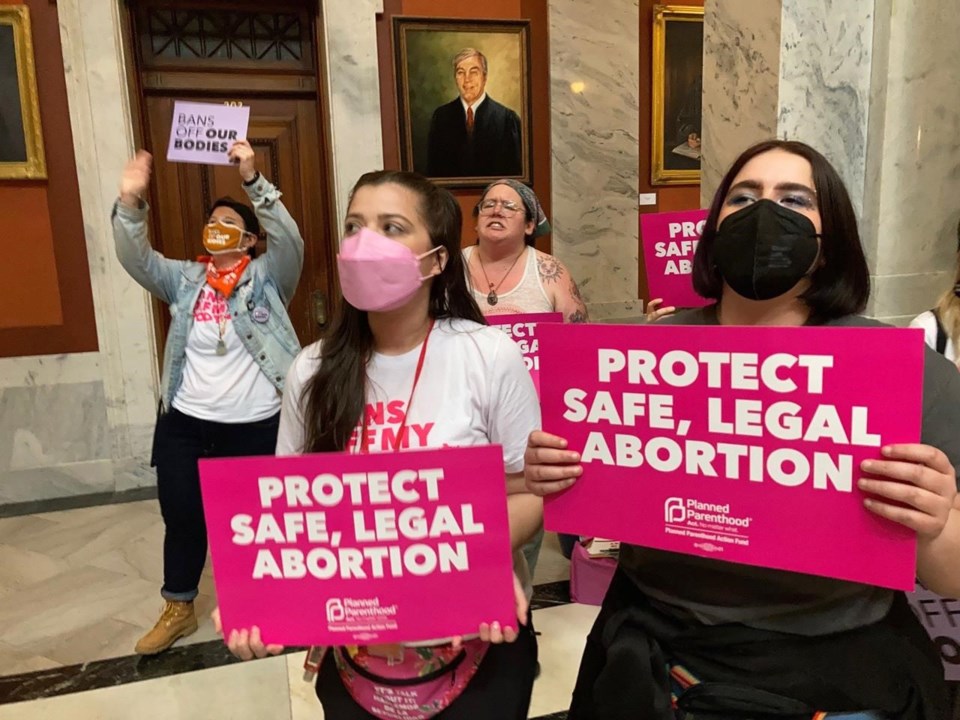FRANKFORT, Ky. (AP) — Kentucky's Supreme Court ruled Thursday that the state's near-total abortion ban will remain in place while it reviews arguments by abortion clinics challenging two state laws.
It was the latest legal setback for the two remaining abortion clinics in Kentucky — both in Louisville, the state's largest city. The state's highest court kept in place a recent lower court ruling that reimposed enforcement of the laws banning nearly all abortions in Kentucky.
Abortion-rights groups vowed to continue their legal fight, saying the government should never have the authority to “force a person to remain pregnant against their will.” The groups called abortion a “critical individual freedom.”
“Make no mistake: abortion bans result in tragic health outcomes and are a form of control over our bodies,” a statement from Planned Parenthood Federation of America, the American Civil Liberties Union and the ACLU of Kentucky said on behalf of the two clinics. “Despite this setback, the fight continues. We will proceed with our case to restore and protect reproductive freedom in Kentucky.”
Abortion rights have been reinstated and then revoked again by judges in Kentucky since the U.S. Supreme Court overturned Roe v. Wade in June.
Kentucky's justices in Thursday's ruling denied a request by the abortion clinics to reimpose an injunction that temporarily prevented the state's near-total abortion ban from taking effect.
In doing so, the Supreme Court ruled that the circumstances presented by the clinics and their attorneys in their motion “do not rise to the level of extraordinary cause.”
The court's chief justice, John D. Minton, noted the weight of the case in a dissent with the majority.
“It is difficult to comprehend a more important or serious legal issue than legal access to abortion in the Commonwealth,” Minton wrote. Minton said the court should have reinstated the lower court's temporary injunction while the case is litigated.
The court agreed to take the case and set a schedule for the submission of briefs and for arguments before the justices. The high court set a hearing for Nov. 15. That will be after the upcoming general election, when a proposed constitutional amendment about abortion is on the ballot. Voters will be asked whether the state's constitution should be amended to say there is no right to abortion.
Kentucky's Republican-dominated legislature enacted a “trigger law” banning nearly all abortions if the U.S. Supreme Court overturned Roe v. Wade. The only exception under the measure is when the health of the mother is threatened. Lawmakers also passed a separate 6-week ban that the clinics also challenged.
The state's Democratic governor and Republican attorney general offered starkly different responses to the Thursday ruling that essentially keeps abortion access blocked in Kentucky.
Gov. Andy Beshear said the state’s highest court left in place an “extremist” law that provides no exceptions for rape and incest victims. Attorney General Daniel Cameron, who is defending the laws in court, called the decision a “victory for life and the rule of law.” Cameron is among several Republicans running for governor in the 2023 election, when Beshear will seek a second term.
Last month, a circuit judge in Louisville temporarily blocked the two state laws while the courts reviewed whether the measures violate Kentucky’s constitution. A state appeals court judge earlier this month said the ban should take effect, even if the laws are in dispute, because in Kentucky, “a statute carries with it the presumption of constitutionality.”
Bruce Schreiner And Dylan Lovan, The Associated Press




